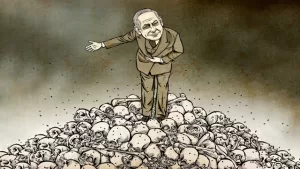In the United States, the word “socialism” has come to have a negative meaning. In that meaning, the word implies the loss of individual sovereignty, rejection of religion and the institution of authoritarian political measures.
While denounced as socialist by U.S. propagandists and repeated by the ill-informed media, in fact, Nicaragua has a mixed economy based on traditional humane Christian spiritual beliefs under the concept of Sandinismo. It also encourages multiple political parties in line with genuinely social democratic ideals.
The foreign media denounce the Ortega administration for its alleged oppression though, in reality, the people who have suffered at its hands are individuals and groups who have repeatedly taken part in U.S. regime-change violence against Nicaragua’s government, people and public institutions.
Keep in mind that, in the U.S., domestic terrorism is also unlawful.
On July 19, 1979, the Sandinista People’s Revolution Party, Frente Sandinista de Liberación Nacional (FSLN), overcame the U.S.-installed puppet dictator dynasty, headed by the Somoza family.
The Sandinista government accepted the election result of 1990 to end the violence caused by the CIA-organized Contras. They ceded control to an opposition party funded by the U.S.
Subsequent right-wing governments ruled Nicaragua from 1990 to 2007, after which the FSLN returned to office upon winning the 2006 election. The FSLN went on to achieve sustained economic and social progress until 2017 and was lauded by the World Bank and the International Monetary Fund (IMF). After the failed 2018 U.S. coup, it became embarrassing for U.S.-funded, non-governmental human rights organizations (NGOs) and international banks to sing Nicaragua’s praises.
Sandinismo under President Daniel Ortega and Vice President Rosario Murillo and the FSLN simply means caring for all of society’s members by providing the necessary infrastructure to ensure an educated, healthy, and economically viable society and a prosperous population and fair elections.
A 2022 survey, conducted by M&R Consultants, confirmed that 70% of Nicaraguans believed its government was leading the country in the right direction. In pitiful contrast, a recent poll found that 71% of Americans believed their country was headed in the wrong direction. The pollsters admitted that they had “never before seen the level of sustained pessimism in the 30-plus year history of the poll.”
President Ortega embraces the concept of good government in the tradition of former U.S. President Franklin Delano Roosevelt (FDR). Under FDR, economic relief from the Great Depression involved reforms in industry, agriculture, finance, waterpower, labor and housing.
Today, many of FDR’s accomplishments have been rolled back, either through willful negligence or by federal regulatory agencies being captured by industry and/or censorship. Even funds set aside for Social Security, as explained by Max Blumenthal of The Grayzone Project in his address to the UN Security Council, are now being funneled into covert warfare.
It seems that the only time funds are “found” are for the military-industrial-complex or other mega complexes. What has emerged in the United States is corporate socialism managed by investment funds such as BlackRock, State Street and Vanguard and bailouts in the trillions of dollars to the New York Federal Reserve dealer banks that service the 0.001 percent of the population. Most U.S. residents and citizens experience the “pull yourself up by your own bootstraps” form of capitalism (a physical action that is impossible to accomplish) or suffer from declining social indicators such as life expectancy and declining birth rates.
The U.S. dollar is no longer supported by gold or industry and is now losing its value as a transactional currency. The SWIFT banking system and petrodollar are being replaced by alternate Chinese, Russian and BRICS transactional systems as a defense against the illegal and unilateral U.S. economic sanctions and outright theft and piracy.
To make matters worse, profits are extracted from the once great U.S. economy and deposited in overseas accounts. Thus, working capital is no longer working through reinvestment. But that does not stop the Fed’s printing of dollars. Eventually, inflation will make the 1970s’ stagflation look like a walk in the park.
Unlike the U.S., Nicaragua Is Not Talk: It Is Actions and Accomplishments
Nicaragua is thriving despite a network of illegal sanctions that are premised on lies told to the American public. As explained by human rights, labor rights and peace activist Daniel Kovalik at his recent book signing—held in Casa Ben Linder in Managua for his latest book Nicaragua, A History of US Intervention & Resistance—Nicaragua serves as the threat of a good example to the United States.
Nicaragua has free health care for all. Since 2007, 24 hospitals have been built along with 182 maternity homes, 190 natural medicine clinics, 73 pain management clinics, 101 centers for the care of people with disabilities, 52 psychosocial care clinics, a medicinal oxygen plant (the first in Central America), a molecular biology laboratory (only the second in Latin America), and national centers for cardiology, diabetes, chemotherapy, palliative care, audiology and speech therapy.
Additionally, the Ortega administration provides land titles to families, has increased transportation routes, provided potable water and sanitation facilities, and expanded low-cost electricity and free internet in public spaces.
The FSLN government provides micro-loans to encourage the development of small businesses under two programs:
- Ahead Program: August 2022-May 2023 • Loans: 6,758 Amount: U.S. $10,343,890.40
- Zero Usury Program: 2007-April 2023 • Loans: 1,605,827 Amount: U.S. $321,070,539
The FSLN also builds affordable housing, offers free education from pre-school to trade and technical schools, and offers scholarships to university students.
There are currently 51,879 university students with scholarships. The U.S. should take notes and U.S. citizens should not expect less from their elected officials. If little Nicaragua can accomplish these great public feats, so can a superpower like the U.S.
(Lauren Smith is an independent journalist and a contributing writer with SanctionsKill.org. Her work has been published by Counterpunch, Common Dreams, Telesur, Monthly Review, Alliance for Global Justice and Global Research (CA), amongst others. Her historical fiction novel based on Nicaragua’s 1979 revolution is due out this year. Courtesy: CovertAction Magazine, a project of Covert Action Publications, Inc., a not-for-profit organization incorporated in the State of New York.)




